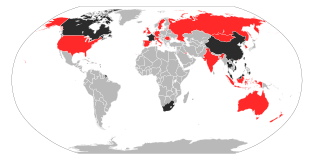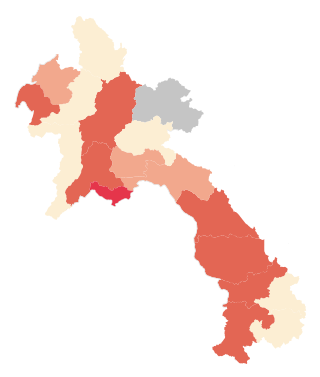
Vaccination is the administration of a vaccine to help the immune system develop immunity from a disease. Vaccines contain a microorganism or virus in a weakened, live or killed state, or proteins or toxins from the organism. In stimulating the body's adaptive immunity, they help prevent sickness from an infectious disease. When a sufficiently large percentage of a population has been vaccinated, herd immunity results. Herd immunity protects those who may be immunocompromised and cannot get a vaccine because even a weakened version would harm them. The effectiveness of vaccination has been widely studied and verified. Vaccination is the most effective method of preventing infectious diseases; widespread immunity due to vaccination is largely responsible for the worldwide eradication of smallpox and the elimination of diseases such as polio and tetanus from much of the world. However, some diseases, such as measles outbreaks in America, have seen rising cases due to relatively low vaccination rates in the 2010s – attributed, in part, to vaccine hesitancy. According to the World Health Organization, vaccination prevents 3.5–5 million deaths per year.

Severe acute respiratory syndrome (SARS) is a viral respiratory disease of zoonotic origin caused by the virus SARS-CoV-1, the first identified strain of the SARS-related coronavirus. The first known cases occurred in November 2002, and the syndrome caused the 2002–2004 SARS outbreak. In the 2010s, Chinese scientists traced the virus through the intermediary of Asian palm civets to cave-dwelling horseshoe bats in Xiyang Yi Ethnic Township, Yunnan.

The 2002–2004 outbreak of SARS, caused by severe acute respiratory syndrome coronavirus, infected over 8,000 people from 30 countries and territories, and resulted in at least 774 deaths worldwide.

The National Centre for Infectious Diseases, previously known as the Communicable Disease Centre, is a national public health institute under the Ministry of Health of Singapore. Located next to Tan Tock Seng Hospital in Novena, all patients within the city-state who are affected with a highly contagious disease are also quarantined at the NCID and is used to control an outbreak of such diseases. The executive director of the hospital is Professor Yee-Sin Leo.

Samuel L. Stanley Jr. is an American educator and biomedical researcher. He was the President of Michigan State University from 2019 until November 2022, and he was the President of Stony Brook University from 2009 to 2019. Stanley is one of the founding directors of the Midwest Regional Center of Excellence for Biodefense and Emerging Infectious Diseases Research.

Céline R. Gounder is an American physician and medical journalist who specializes in infectious diseases and global health. She was a member of the COVID-19 Advisory Board transition team of then-incoming U.S. president Joe Biden. In 2022, she joined the Kaiser Family Foundation as senior fellow and editor-at-large for public health at Kaiser Health News.

The COVID-19 pandemic in Sri Lanka is part of the ongoing worldwide pandemic of coronavirus disease 2019 (COVID-19) caused by the severe acute respiratory syndrome coronavirus 2 virus. The first case of the virus in Sri Lanka was confirmed on 27 January 2020, after a 44-year-old Chinese woman from Hubei, China, was admitted to the Infectious Disease Hospital in Angoda, Sri Lanka. As of 1 September 2021, a total of 462,767 COVID-19 cases had been recorded in the country, 386,509 patients had recovered from the disease, and 10,140 patients had died.

The COVID-19 pandemic in Liechtenstein was a part of the ongoing worldwide pandemic of coronavirus disease 2019 caused by severe acute respiratory syndrome coronavirus 2. The virus was confirmed to have reached Liechtenstein in early March 2020. With a total population of 38,896 and 54 confirmed deaths, the country has one of the highest rate of confirmed deaths per capita in the world.

The COVID-19 pandemic in Monaco was a part of the ongoing worldwide pandemic of coronavirus disease 2019 caused by severe acute respiratory syndrome coronavirus 2. The virus was confirmed to have reached Monaco on 29 February 2020. As of February 8, 2021, the infection rate is 1 case per 19 inhabitants and the death rate is 1 in 1,613. As of February 2022, a total of 9,053 people were affected by the Covid-19 since the beginning of the pandemic. As of 4 December 2022, a total of 71,027 vaccine doses have been administered.

The COVID-19 pandemic was confirmed to have spread to Georgia when its first case was confirmed in Tbilisi on 26 February 2020.

The COVID-19 pandemic in Laos is part of the worldwide pandemic of coronavirus disease 2019 caused by severe acute respiratory syndrome coronavirus 2. On 24 March 2020, Laos became the last country in Southeast Asia to report its confirmed case of the virus. As of 05 June 2022, there were a total of 210,081 cases and 756 deaths. On 4 May 2021, Laos exceeded 1,000 cases of COVID-19. Five days later, the country recorded the first death.

Andrew John Ullmann is a German physician and politician of the Free Democratic Party (FDP) who has been serving as a member of the Bundestag from the state of Bavaria since 2017.

The COVID-19 pandemic in Anguilla is part of the ongoing global viral pandemic of coronavirus disease 2019 (COVID-19), which was confirmed to have reached the British Overseas Territory of Anguilla on 26 March 2020. On 26 April 2020, all patients had recovered and on 22 November a new imported case was announced.
Allison Joan McGeer is a Canadian infectious disease specialist in the Sinai Health System, and a professor in the Department of Laboratory Medicine and Pathobiology at the University of Toronto. She also appointed at the Dalla Lana School of Public Health and a Senior Clinician Scientist at the Lunenfeld-Tanenbaum Research Institute, and is a partner of the National Collaborating Centre for Infectious Diseases. McGeer has led investigations into the severe acute respiratory syndrome outbreak in Toronto and worked alongside Donald Low. During the COVID-19 pandemic, McGeer has studied how SARS-CoV-2 survives in the air and has served on several provincial committees advising aspects of the Government of Ontario's pandemic response.

This article documents the chronology and epidemiology of SARS-CoV-2 in 2019, the virus that causes coronavirus disease 2019 (COVID-19) and is responsible for the COVID-19 pandemic. The first human cases of COVID-19 known to have been identified were in Wuhan, Hubei, China, in December 2019. It marked the beginning of the 2019–2020 COVID-19 outbreak in mainland China.
National Institute of Infectious Diseases may refer to:
The COVID-19 pandemic in the Federated States of Micronesia is part of the ongoing worldwide pandemic of coronavirus disease 2019 caused by severe acute respiratory syndrome coronavirus 2. The virus has reached the Federated States of Micronesia on 8 January 2021.

The COVID-19 pandemic in the British Indian Ocean Territory is part of the ongoing worldwide pandemic of coronavirus disease 2019 caused by severe acute respiratory syndrome coronavirus 2. The virus was confirmed to have reached Diego Garcia of the British Indian Ocean Territory in November 2020.















